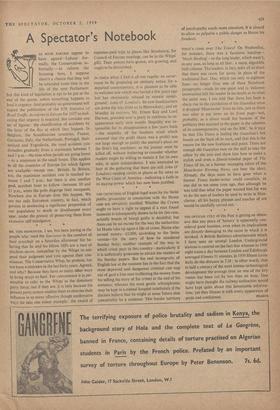THE CRITICISMS of English legal ways by the Swiss public
prosecutor in connection with the Hume case are obviously justified. Whether the Crown ought to have a right to appeal if a man found innocent is subsequently shown to be (in this case, actually boasts of being) guilty is doubtful; but there can be no excuse for the way the authorities let Hume take up again a life of crime. Hume also earned money—£2,000, according to the Swiss version—for the story of how he murdered Stanley Setty; another example of the way in which crime pays in this country—particularly if it is sufficiently gruesome to attract the readers of the Sunday papers. But the real incongruity of English law at the moment lies in the fact that the most depraved and dangerous criminal can step out of gaol a free man (collecting the money from his selling the story of his crime) at the end of his sentence; whereas the most gentle schizophrenic may be kept in a mental hospital indefinitely if the doctors believe that he might at some future date conceivably be a nuisance. This border territory
of psychopathy needs more attention; it is absurd to allow so palpable a public danger as Hume his freedom.






































 Previous page
Previous page